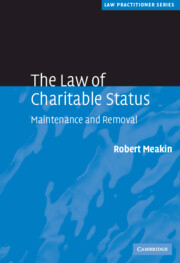Book contents
- Frontmatter
- Contents
- Table of Cases
- Table of Statutes
- 1 Introduction
- 2 Essential indicia of charitable status
- 3 The powers of the Commission to remove charities from the register
- 4 Limits on the Commission's powers to remove controversial charities from the register
- 5 Property
- 6 The Commission's powers of investigation and the use of those powers to remove charities from the register
- 7 How the Commission's powers to remove charities from the register may be affected by changes to the law of charitable status
- 8 Grounds for appeal
- 9 Conclusion
- Bibliography
- Index
2 - Essential indicia of charitable status
Published online by Cambridge University Press: 23 July 2009
- Frontmatter
- Contents
- Table of Cases
- Table of Statutes
- 1 Introduction
- 2 Essential indicia of charitable status
- 3 The powers of the Commission to remove charities from the register
- 4 Limits on the Commission's powers to remove controversial charities from the register
- 5 Property
- 6 The Commission's powers of investigation and the use of those powers to remove charities from the register
- 7 How the Commission's powers to remove charities from the register may be affected by changes to the law of charitable status
- 8 Grounds for appeal
- 9 Conclusion
- Bibliography
- Index
Summary
Introduction
At this stage it is necessary to explore the essential indicia of charitable status because this is a crucial issue in the context of the Commission's powers to remove charities which it ‘no longer considers is a charity’.
It is submitted that the essential indicia of charitable status are being subject to a legal obligation to carry out charitable purposes, being within jurisdiction, having charitable purposes, which includes the requirement of public benefit and being viable in the sense that, if the charitable purposes are impossible from the outset, that a general, rather than a specific, charitable intention is expressed by the settlor so that the property is applied cy-pres. It is arguable that a lack of independence from the state is part of the essential indicia of charitable status, although this argument is not supported in this book.
It is submitted that an institution which lacks one or more of the essential indicia of charitable status from its inception cannot be a charity for the purposes of the Charities Acts 1993 and 2006 and will therefore have been mistakenly registered. It is argued that an institution could have the essential indicia of charitable status at its inception, but might subsequently lose some by the exercise of an express power in the governing instrument, or because its objects have ceased to be charitable in law due to a change in social circumstances or the passage of time.
- Type
- Chapter
- Information
- The Law of Charitable StatusMaintenance and Removal, pp. 12 - 44Publisher: Cambridge University PressPrint publication year: 2008



